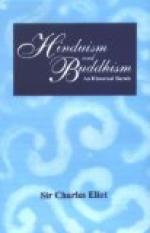[Footnote 1117: As in their legends, so in their doctrines, the uncanonical writings are more oriental than the canonical and contain more pantheistic and ascetic sayings. E.g. “Where there is one alone, I am with him. Raise the stone and thou shalt find me: cleave the wood and I am there” (Oxyrhynchus Logia). “I am thou and thou art I and wheresoever thou art I am also: and in all things I am distributed and wheresoever thou wilt thou gatherest me and in gathering me thou gatherest thyself” (Gospel of Eve in Epiph. Haer. xxvi. 3). “When the Lord was asked, when should his kingdom come, he said: When two shall be one and the without as the within and the male with the female, neither male nor female” (Logia).]
[Footnote 1118: Hinduism, p. 549. The original is to be found in Bhartrihari’s Vairogyasatakam, 112.]
[Footnote 1119: The Buddhist and Christian Gospels, 4th ed. 1909.]
[Footnote 1120: Mahavagga, VIII. 26.]
[Footnote 1121: Lotus, chap. V.]
[Footnote 1122: VII. 15-21 in S.B.E. XLV. p. 29.]
[Footnote 1123: Sam. Nik. XLII. VII.]
[Footnote 1124: Ed. Cowell, p. 611.]
[Footnote 1125: See Rhys Davids, Buddhist India, p. 206, and Winternitz, Ges. Ind. Lit. II. 91.]
[Footnote 1126: Maj. Nik. VI.]
[Footnote 1127: Gospel of Thomas: longer version, chaps, VI. XIV. See also the Arabic and Syriac Gospels of the Infancy, cf. Lalita-vistara, chap. X.]
[Footnote 1128: Pseudo-Matthew, chap, XXII.-XXIV. and Lal. Vist. chap. VIII.]
[Footnote 1129: Pseudo-Matthew, XIII. Cf. Dig. Nik. 14 and Maj. Nik. 123. Neumann’s notes on the latter give many curious medieval parallels.]
[Footnote 1130: See Gospel of James, XVIII. and Lal. Vist. VII. ad init.]
[Footnote 1131: See Rhys Davids, Buddhist Birth stories, 1880, introduction; and Joseph Jacobs, Barlaam and Josaphat, 1896.]
[Footnote 1132: Nos. 12 and 537.]
[Footnote 1133: As is also the idea that [Greek: gnosis] implies a special ascetic mode of life, the [Greek: bios gnostikos].]
[Footnote 1134: Irenaeus, I. XXV.]
[Footnote 1135: It appears in the Pistis Sophia which perhaps represents the school of Valentinus. Basilides taught that “unto the third and fourth generation” refers to transmigration (see Clem. Al. fragm. sect. 28 Op., ed. Klotz, IV. 14), and Paul’s saying “I was alive without the law once” (Rom. vii. 9), to former life as an animal (Orig. in Ep. ad Rom. V. Op. iv. 549).]
[Footnote 1136: For Gnosticism, see Buddhist Gnosticism, J. Kennedy in J.R.A.S. 1902, and Mead, Fragments of a faith Forgotten.]
[Footnote 1137: Chavannes et Pelliot, “Un traite Manicheen retrouve en Chine,” J.A. 1911, I, and 1913, II.]




